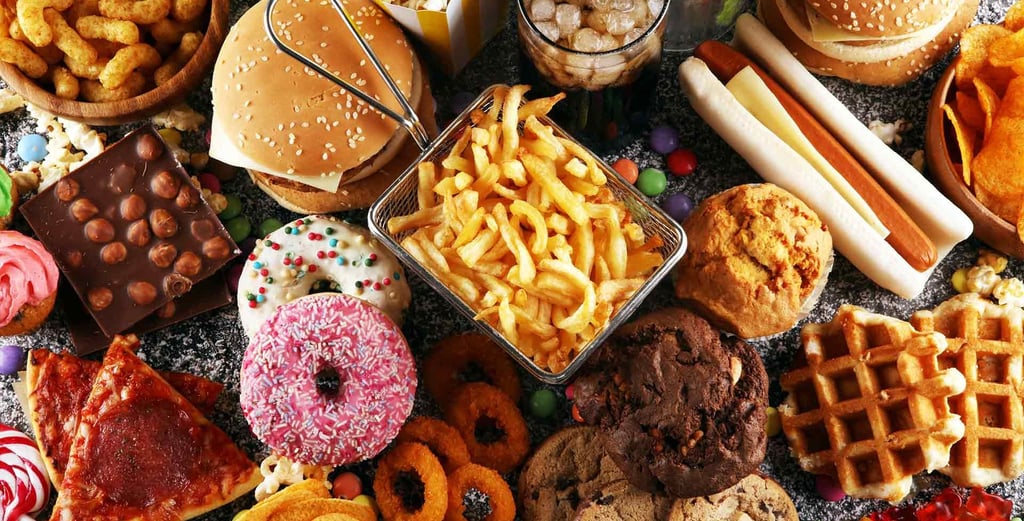5 Foods to Limit to Reduce Cancer Risk
Certain foods can increase your risk of cancer. Find out which ones and how to adjust your diet for better health.
HEALTHBLOG-LIST
1/12/20252 min read


Our diet plays a crucial role in our overall health, and this includes the prevention of serious diseases like cancer. While no single food can directly "cause" cancer, some are associated with an increased risk. In this article, we will explore 5 categories of foods to consume in moderation to minimize these risks and promote your well-being.
Summary
Fried foods, a source of hidden danger
Processed and sugary foods, an explosive cocktail
Processed meat and deli meats, to be consumed with caution
Processed fats, a sneaky enemy
Sugary drinks and confectionery, pleasures to limit
FAQ
Conclusion
In short
Limit fried foods: they contain acrylamide, a potentially carcinogenic substance.
Reduce processed foods: rich in sugars, salt and additives, they promote inflammation.
Moderate consumption of processed meat: deli meats and red meats are linked to an increased risk of colorectal cancer.
Favor healthy fats: avoid processed fats found in industrial products.
Reduce sugary drinks: they increase the risk of obesity, a risk factor for several cancers.
1. Fried foods, a source of hidden danger
Fried foods, while delicious, can contain a substance called acrylamide, formed during high-temperature cooking. Acrylamide is classified as "probably carcinogenic to humans" by the International Agency for Research on Cancer (IARC).
Did you know? Acrylamide is mainly formed in starchy foods such as potatoes, cereals and bread, when they are fried, grilled or baked at high temperatures.
2. Processed and sugary foods, an explosive cocktail
Processed foods, such as ready meals, industrial cookies and snacks, are often high in added sugars, salt and additives. Excessive consumption of these foods can lead to chronic inflammation, a factor that promotes the development of certain cancers.
Tip: Choose fresh, unprocessed foods, and read labels carefully to identify hidden sugars.
3. Processed meat and deli meats, to be consumed with caution
Processed meat, such as ham, bacon, sausages and deli meats, has been classified as "carcinogenic to humans" by the IARC. Excessive consumption of these products is associated with an increased risk of colorectal cancer.
Recommendation: Limit your consumption of red and processed meat, and favor alternative protein sources such as fish, legumes and eggs.
4. Processed fats, a sneaky enemy
Processed fats, such as hydrogenated oils and margarines, are found in many industrial products (pastries, cookies, prepared meals). They are rich in trans fatty acids, which promote inflammation and increase the risk of cardiovascular disease, and potentially certain cancers.
Alternative: Opt for healthy fats such as olive oil, rapeseed oil, avocados and nuts.
5. Sugary drinks and confectionery, pleasures to limit
Sugary drinks, such as sodas and industrial fruit juices, are high in added sugars and contribute to weight gain and obesity. Obesity is a major risk factor for several types of cancer, including colon, breast and endometrial cancer.
Tip: Drink mainly water, unsweetened tea or herbal teas.
FAQ
Q: Are all fried foods carcinogenic?
A: The risk is related to the formation of acrylamide during high temperature cooking. Favor gentle cooking methods (steaming, boiling) and limit frying, grilling and baking at high temperatures.
Q: Can I still eat meat?
A: It's about moderating your consumption of red and processed meat, and favoring white meat (poultry) and alternative protein sources.
Q: How can I tell if a food contains processed fats?
A: Read the ingredient list carefully and look for the terms "hydrogenated oils" or "trans fatty acids".
Conclusion
Adopting a balanced and varied diet, rich in fruits, vegetables and whole grains, is essential to reduce the risk of cancer. By limiting your consumption of the 5 food categories mentioned in this article, you actively contribute to your health and well-being.
